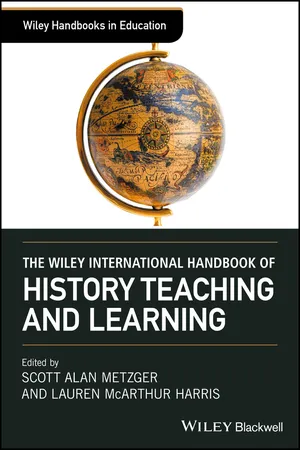
The Wiley International Handbook of History Teaching and Learning
- English
- ePUB (mobile friendly)
- Available on iOS & Android
The Wiley International Handbook of History Teaching and Learning
About this book
A comprehensive review of the research literature on history education with contributions from international experts
The Wiley International Handbook of History Teaching and Learning draws on contributions from an international panel of experts. Their writings explore the growth the field has experienced in the past three decades and offer observations on challenges and opportunities for the future. The contributors represent a wide range of pioneering, established, and promising new scholars with diverse perspectives on history education.
Comprehensive in scope, the contributions cover major themes and issues in history education including: policy, research, and societal contexts; conceptual constructs of history education; ideologies, identities, and group experiences in history education; practices and learning; historical literacies: texts, media, and social spaces; and consensus and dissent. This vital resource:
- Contains original writings by more than 40 scholars from seven countries
- Identifies major themes and issues shaping history education today
- Highlights history education as a distinct field of scholarly inquiry and academic practice
- Presents an authoritative survey of where the field has been and offers a view of what the future may hold
Written for scholars and students of education as well as history teachers with an interest in the current issues in their field, The Wiley International Handbook of History Teaching and Learning is a comprehensive handbook that explores the increasingly global field of history education as it has evolved to the present day.
Frequently asked questions
- Essential is ideal for learners and professionals who enjoy exploring a wide range of subjects. Access the Essential Library with 800,000+ trusted titles and best-sellers across business, personal growth, and the humanities. Includes unlimited reading time and Standard Read Aloud voice.
- Complete: Perfect for advanced learners and researchers needing full, unrestricted access. Unlock 1.4M+ books across hundreds of subjects, including academic and specialized titles. The Complete Plan also includes advanced features like Premium Read Aloud and Research Assistant.
Please note we cannot support devices running on iOS 13 and Android 7 or earlier. Learn more about using the app.
Information
Section II
Conceptual Constructs of History Education
5
Historical Thinking: Definitions and Educational Applications
Historical Thinking in England
research and public examinations for SCHP were closely linked, and new post‐hoc assessment schemes were being developed by examiners. Hence SCHP provided both the impetus and an opportunity for the development of sophisticated assessment techniques providing additional large scale evidence about children’s ideas and historical thinking. (p. 138)
- “History is not just a matter of common‐sense.” Students tend to think that people in the past shared their own contemporary beliefs and values but were more stupid (Lee & Ashby, 2001; Shemilt, 1984). As Lee (2011) writes, Parts of history degenerate into tales of unintelligible mistakes made by mental defectives. It is only as children abandon the assumption that people in the past saw the world as we do that meaningful history becomes possible for them. Hence they must substitute counter‐intuitive ideas for their common‐sense everyday life understandings. (p. 136)Lee (2011) has also made the point that if children “assume that we can only know what we can directly witness, and that history reports a fixed past (it only happened once, after all) then history is impossible” (p. l36). Children may not understand that there is no fixed past and that history is constructed from available evidence. “Because historical accounts are not copies of the past, but share some of the characteristics of both metaphors and theories, there can be more than one account of ‘the same thing’ without one necessarily being fake or distorted” (Lee, 2011, p. 136).
- “Students can develop more powerful ideas about history from at least age seven.” The English research indicates that students develop increasingly powerful understanding of second‐order concepts. However, Lee cautions that it is important to teach students the deep meaning of these concepts because 14‐ to 16‐year‐olds are capable of using specialist terminology “in superficially convincing ways without grasping the nature or significance of the conceptual apparatus to which this terminology pertained” (p. 184).
- “Progression models can be constructed for some secon...
Table of contents
- Cover
- Title Page
- Table of Contents
- Notes on Contributors
- Foreword: History Educators in a New Era
- Acknowledgments
- Introduction
- Section I: Policy, Research, and Societal Contexts of History Education
- Section II: Conceptual Constructs of History Education
- Section III: Ideologies, Identities, and Group Experiences in History Education
- Section IV: History Education: Practices and Learning
- Section V: Historical Literacies: Texts, Media, and Social Spaces
- Index
- End User License Agreement